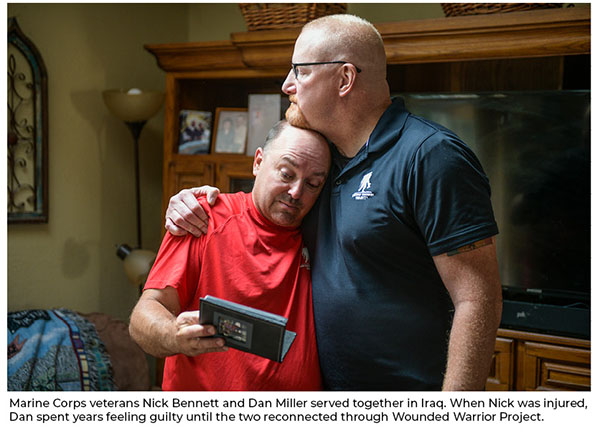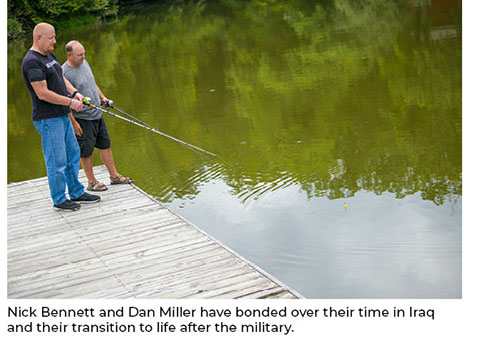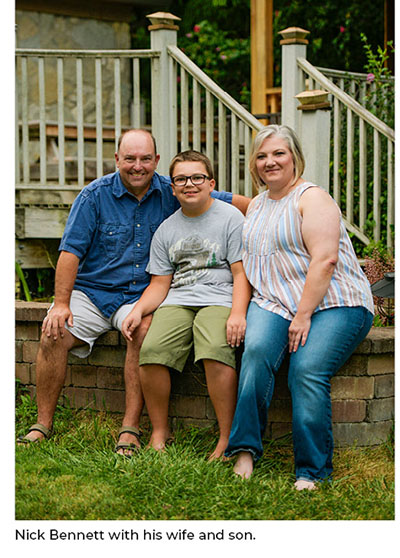Pair of Marines Reconnect Through Wounded Warrior Project and Knock Down Mental Health Barriers

Marine veterans Nick Bennett and Dan Miller held a box of shrapnel in their hands. It’s not the sort of thing that helps most people bond. But the jagged metal pieces were surgically removed from Nick’s body after a rocket attack in Iraq – an injury that Dan felt guilty about for years. This is the story of how the pieces that tore them apart in combat, later brought two warriors together.
Nick Bennett always wanted to follow in the footsteps of his grandfathers. He grew up hearing his grandfathers’ WWII survival stories and developed a strong urge to take his place in their legacy. He enlisted in the Marine Corps straight out of high school and served in the early 1990s. He came home after he was honorably discharged and built a family.
After 9/11, Nick thought about how fortunate he was to have a family and to enjoy watching his children grow up.
“When the children were old enough, I reenlisted,” Nick said. “I arrived in Iraq close to my 35th birthday, and some of the younger recruits seemed like kids to me. I had already experienced being a dad and got to enjoy my children so if something were to happen to me at this point, I’d been OK with it.”
Nick was put in charge of the internet café, where he had the chance to get to know fellow brothers and sisters in arms. He liked what he was doing but aspired to be on the front lines. He asked to be moved closer to combat.
“These were my guys, and I wanted to be there to protect them; I wanted to be out there with them,” Nick said. He pled his case and eventually was assigned to base security. He helped run gate security, checking all vehicles that came into the base.
With support and training from Gunnery Sgt. Dan Miller, Nick eventually worked his way into missions beyond the gate. On one occasion, he joined a unit sent to apprehend someone suspected of attacking U.S. troops. The mission went as planned and the person was apprehended. Shortly after, the base was attacked in retribution.
“The week of Nov. 11, 2004 (Veterans Day) was our worst week in Iraq,” Nick said. “We lost half our guys that week.”
Nick remembers the day he barely survived a rocket attack – in blurry details. As the unit prepared to go out on another mission, someone asked for an item and Nick stepped near the Humvee to retrieve it. It was then he heard an incoming rocket whistle toward him.
“I knew what it was; I knew I was going to be hit and I might not be coming home.”
One Rocket Attack, Two Perspectives
Within five days, Nick would land stateside to be treated for multiple injuries. In the aftermath of surgeries to remove shrapnel, fighting infections, and trying new procedures to save his left hand, some memories turned hazy. But one thing was certain: Nick never regretted his request to be put on the front lines and was always grateful to the sergeant who believed in him and gave him the opportunity to put his life on the line for his country.
As months and years passed, Nick recovered physically, went through personal trials that included a divorce, and rebuilt his life. He always thought kindly of the sergeant who helped him live out his purpose and survive.
However, his gunnery sergeant had a different and anguished perspective.
“I didn’t talk to Nick for a while, not because I didn’t want to talk with him, but out of guilt – it was a survivor’s guilt thing for me,” Dan said.
Dan thought while performing first-aid efforts to save Nick, he might have accidentally broken Nick’s jaw. That was not the case.

But that did not stop Dan’s memory of that day – and many other combat-related events – from playing like a symphony of guilt and pain over and over.
As his Sergeant, Dan felt responsible for allowing Nick to be in harm’s way and suffer injuries, and his guilt made him isolate.
While they were downrange, Dan had initially pushed back on Nick’s request to move up front. Dan recalled Nick’s persistence.
“He’s short in stature,” Dan said. “I’m 6-foot-3 and he might be 5-nothing – but he’s got the heart of a lion and he kept at it. So, eventually I said, ‘fine.’ He jumped in with both feet and took a lot of responsibility that I needed someone to assume.”
It was an important mission in the middle of a chaotic time in Iraq. They were still looking for those responsible for hurting Marines and Navy personnel.
“Moments after the attack, I remember me picking up chunks of Nick,” Dan said. “I thought he might die. It broke my spirit. We lost 14 other guys in that deployment. Many other people I know got hurt.”
Dan carried that guilt with him for years. He served five years of active duty and 24 years as a reservist. He also worked as a police officer. He struggled to re-enter civilian life, went through a divorce, had suicidal ideations, and preferred to avoid others.
Eventually, Dan found his way to mental wellness and a job with Wounded Warrior Project® (WWP). While on WWP training in Jacksonville, Florida, he received a surprise. Nick was there, too, as a fellow wounded warrior who had found hope and purpose through WWP.
“To have Nick in front of me like that and to be able to talk with him after so many years…,” Dan trails off, looking for the words to describe the emotional reunion. “Nick was one of mine, and I felt and still feel responsible for him. He did heal up well, he has a great life, and I even got to meet his kids. He knows how I’ve struggled with PTSD, divorce, TBI symptoms. We’re brothers; we’re brothers for life.”
Connections that Knock Down Walls and Combat Stigma
According to WWP’s Annual Warrior Survey, almost 20% of warriors served by WWP reported difficulty or delays in receiving or continuing mental health care after separating from the military. Of those, nearly 4 in 5 warriors (78.4%) said they would prefer to solve the problem on their own, 2 in 3 (66.2%) feel embarrassed or ashamed to get care, and nearly 3 in 5 (59.4%) are unsure where to find mental health care.
“When I first separated from the military, I felt like I was broken,” Nick said. After the visible injuries were accounted for, the invisible injuries took over his interactions.

Nick’s family ties unraveled. One Easter weekend, Nick found himself at a VA psychiatric facility because his family feared he might harm himself.
“I didn’t attempt suicide because I didn’t want to end up back in the hospital like I was after injury,” Nick said. “That was the reality of my life at the time.”
Nick attended WWP’s Project Odyssey as a warrior and as a mentor and made connections through peer support groups. “There were many things in my life that I just couldn’t explain until I connected with other warriors,” Nick said. “You see similar issues and you start to connect the dots.”
Reuniting with Dan brought his healing process full circle.
“I didn’t know until recently that Dan felt guilty about putting me on guard duty,” Nick said.
“I had left him a couple of messages on his phone at work. I was worried about him. I wanted to tell him I loved him, and I was all right. I wanted to tell him ‘I owe you everything for what you did that day.’ I had no clue what he was dealing with.”
A reunion became a reality when WWP staff intervened to bring them together.
“I’ll never forget Dan walking into the room and me just being able to say, ‘You allowed me the opportunity to be a Marine, you allowed me to follow in my family’s footsteps. This is the legacy that you allowed to happen. And it’s because of you that another chapter is written in our family. And because of you, this is how my life has turned out. You saved a lot of lives that day, and it wasn’t because of you that I got hurt.’”
Dan and Nick were able to share their recollection of their time downrange and bond over the bumpy roads they each traveled after leaving the military. Later, they met at Nick’s home and pieced together what happened during and after the rocket attack in Iraq. The box of shrapnel and a few photos helped them connect with each other – and with that time in their lives.
“When you see the destruction, the lives lost, the sacrifices, and the suffering, it changes you,” Dan said. “But when it was happening, I didn’t have time to process it. So, I buried it. I had to because there was always the next mission, the next rocket or improvised explosive device, the next danger to prevent or avoid.”
Dan stays active helping other veterans through his work at WWP. Nick has built a new family, in addition to reconnecting with his older children.
The moment that tore apart the two Marines has transformed into an opportunity to shine a light for others – like a beacon in the darkness.
“When I’m having a bad day, I think about that moment in combat, and it reminds me that just a split second in time can change everything,” Dan said. “I was able to go back and help Nick. He’s younger than me, so he’s my little brother. For life. I heal a little bit more every time we see each other.”
Connect with other veterans and start your healing journey.
Nick and Dan share their story of healing and friendship.
Contact: Raquel Rivas – Public Relations, rrivas@woundedwarriorproject.org, 904.426.9783
About Wounded Warrior Project
Since 2003, Wounded Warrior Project® (WWP) has been meeting the growing needs of warriors, their families, and caregivers — helping them achieve their highest ambition. Learn more.